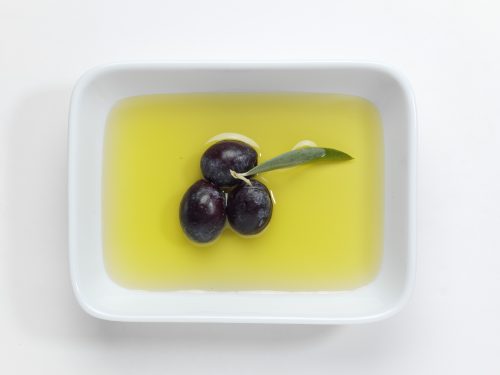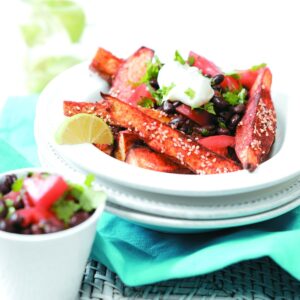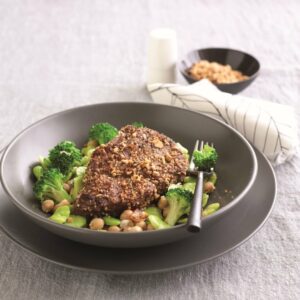
Fat is one of the most talked-about nutrients but one of the most misunderstood. We answer your questions so you can make healthier choices.
- What are fats?
Fat is a macronutrient found in food, along with protein and carbohydrate. Fats are chemically similar substances composed of fatty acids. They include liquid oils such as olive oil, as well as solid fats such as butter, vegetable shortening, ghee and lard. - Is a fat-free diet healthy?
No! It's necessary to include some fat in our diet because fats provide essential fatty acids, fat-soluble vitamins and a concentrated form of energy. We need fatty acids to build and maintain cell membranes and to make certain hormones. So fats are essential, but it's important to choose the right type of fat. - How did fat get such a bad reputation?
Saturated fat is the main culprit in raising cholesterol levels and heart disease rates. However, there are other types of fats which are essential for good health. - Which fats are the good ones?
Fats are classified as saturated or unsaturated, depending on their chemical structure. Unsaturated (good) fats include polyunsaturated and monounsaturated types, which are better for you because they help maintain healthy cholesterol levels. Polyunsaturated 'good' oils include sunflower, safflower, soy bean, walnut and sesame oils. Monounsaturated 'good' oils include avocado, canola, olive, macadamia, rice bran and peanut oils. - Why do I love fatty foods so much?
Humans are driven by a powerful survival instinct based on a 'feast or famine' environment. Although times have changed and food is now plentiful, we are still pre-programmed to eat high-energy foods so should food become scarce, we will have a better chance of surviving. We also tend to eat more fat than is good for us because fat is full of flavour and gives foods such as biscuits, pastry and deep-fried fish'n'chips a pleasant crunchy texture. Food manufacturers also often add fats to many foods to improve flavour and texture, so you may be eating more fat than you realise. - Is fat really fattening?
Although fat is the most energy-dense nutrient (containing 38kJ
compared to 17kJ per gram for protein and carbohydrate), any food can
cause weight-gain if the total amount of kilojoules you eat is more
than you need. Obesity rates have increased without any apparent
increase in the proportion of fat we eat. - Which fats should I be eating less?
Saturated fats are found in fatty meat, butter, cream, full-fat milk and dairy foods, processed foods containing palm oil, and many deep-fried takeaway foods. Chocolate and coconut products like Kremelta and coconut cream are also rich in saturated fat. - Which is healthier: butter or margarine?
Table margarine (more accurately termed 'oil spread' in New Zealand), is recommended as a healthier choice than butter by the New Zealand Heart Foundation. Oil spread is better because it is made with healthy oils and therefore contains much less saturated fat than butter. Contrary to popular belief, oil spreads are not a major source of trans fats. Check the nutrition information panel and choose spreads with less than 15g saturated fat per 100g. - How much fat should we eat?
Between 30-35% of our daily kilojoule intake from fat is usual. In a typical diet of 8700kJ, this is between 50-80g fat each day. Fat is already present in some foods, so a healthy amount to use is between 1½-2½ tablespoons of healthy oils and oil spreads a day. You may need a little less or a little more, depending on your energy needs. Saturated fat should make up no more than 10% of your daily kilojoule intake, or no more than about 30g in a typical diet. - I'm trying to lose weight. How much fat can I eat?
To lose weight, you need to eat fewer kilojoules. In order to stay healthy, your diet must still be balanced, so the proportion of fat in your diet should not fall too low or you may not eat enough essential fats – about 30% of your daily kilojoules is about right. In a typical weight-loss diet of 6000kJ, this means 50g of fat daily. Most of this should come from healthy, added 'good' fats such as oils and oil spreads. - Which is the best oil to use?
Any oil made from vegetables, seeds or fruits is good (see question 4). Coconut and palm oils are the exceptions to this rule – avoid them as they are high in saturated fat. - How should oil be stored?
Oil reacts to air, light and heat,
so it needs to be stored in a cool dark place – not next to the stove.
Buying oil in tins will help protect it from light. If you buy olive
oil in a bottle, store it in the cupboard. Oil is best used within
three to four months of opening, so buy it in smaller quantities to
keep it fresh. - Is it safe to re-use oil?
Reheating will cause oils to oxidise and degrade, but some do this more slowly. Polyunsaturated oils are the most readily oxidised, but mono-unsaturated oils such as olive oil are more stable and can be re-used. Be sure to strain out any bits of food left in the oil, store in a sealed jar after cooling, and only re-use the oil a few times. - Can I cook with extra-virgin olive oil?
Yes. But other oils,
such as rice bran oil, have a higher smoke point, which means these
oils tolerate high temperatures better than extra-virgin olive oil.
Extra-virgin olive oil also costs more. - What is extra-virgin olive oil?
Extra-virgin olive oil comes from the first mechanical pressing of olives and is rich in antioxidants. The alternative, refined oil, is produced when the pulp is further processed to extract every last drop of oil. - How will I know if oil has gone off?
Oil that has oxidised, or gone rancid, has a characteristic stale, musty smell. Don't use rancid oil. Healthier oils go rancid more easily than unhealthy ones, so use them quickly and store them correctly. - What's the latest on canola oil?
Canola oil is predominantly monounsaturated, and it also has some short-chain omega-3 fatty acids (see question 21). Canola oil is recommended as a healthy choice. - How much salad dressing and mayonnaise can I use?
Mayonnaise and salad dressings are usually made with healthy oils but commercial ones can be quite salty. It's best to make your own mayonnaise and use it in moderation. - What are trans fats?
Trans fats are a particular type of bad fat that should be limited because they adversely affect cholesterol levels. They are naturally present in low levels in butter and meat fat, but they are produced in higher amounts when liquid oils are partially hydrogenated to make them solid. They are often used commercially to make pastry, biscuits and cakes. Commercial deep-frying oils can contain trans fats, although one prominent fast-food chain has already switched to a low-trans frying oil. Eating a diet low in saturated fats will help you eat less trans fats as well. - What's so good about rice bran oil?
Rice bran oil is a mostly monounsaturated oil that contains small amounts (around 1%) of a naturally occurring plant sterol called oryzanol that may help lower cholesterol absorption. It has a high smoke point so it's good for frying. - What are omega-3 fatty acids?
Why we need them: Omega-3 fatty acids are essential polyunsaturated fatty acids. Our bodies can't make them so we need to get them from our diet. Omega-3 refers to both short-chain fatty acids (plant foods) and long-chain fatty acids (animal foods). It's best to eat a mix of both.
Where to find them: Plant foods such as canola and soy bean oils, flaxseeds and walnuts are the best sources of omega-3 short-chain fatty acids. The richest source of long-chain fatty acids is oily seafood (especially mackerel, sardines and salmon), eggs, brains, liver, kidneys, and lean red meat (especially pasture-fed beef and lamb). Fish-oil capsules can help boost your omega-3 intake.
What they do: Omega-3 fats, and especially the long-chain fats, are linked to better heart and mental health, a reduced risk of inflammatory diseases, and brain development in children.
© Healthy Food GuideAll rights reservedReproduction without permission prohibited
www.healthyfood.com
www.healthyfood.com










